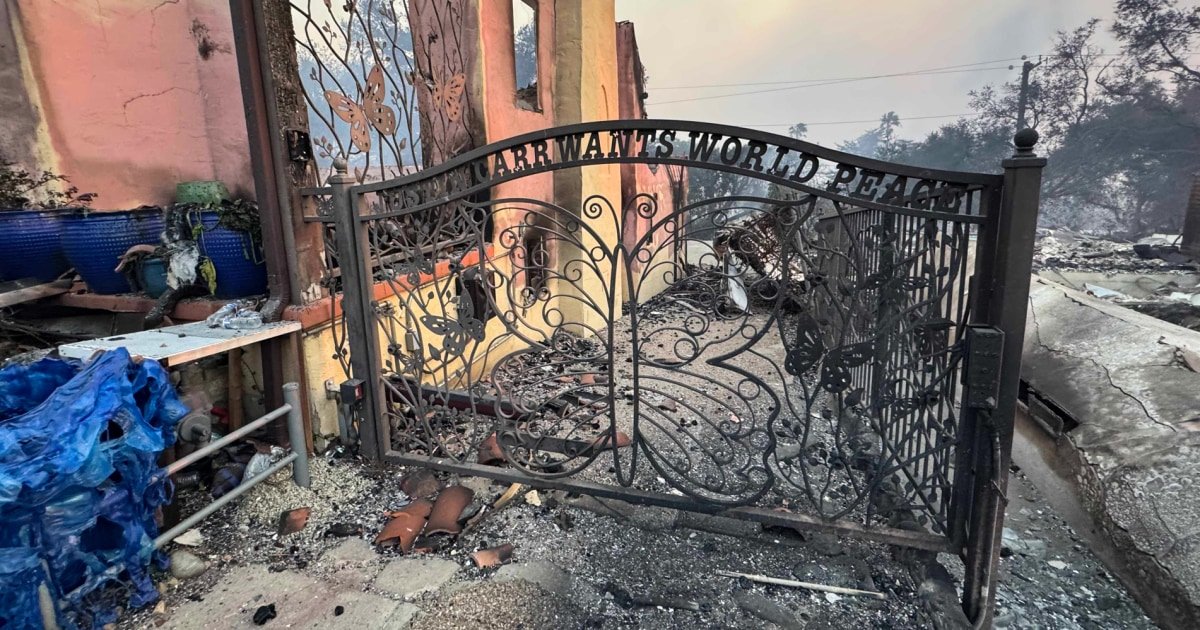Susan Toler Carr and her husband, Darrell, had to see for themselves. A neighbor had given them the devastating news that their home of 25 years had burned down in the fires that have ravaged the Los Angeles area since last week.
The couple fled their Altadena neighborhood last Tuesday night for a friend’s guest house in Toluca Lake. The next day, they bypassed police checkpoints by maneuvering down a side street, passing a burning elementary school, downed power lines, trees and smoldering debris.
When they arrived at what had been their house, most of it was gone. A portion of their Spanish-style home built in 1924 was still burning. Part of the structure remained standing, including a wrought iron gate commemorating the life of their son, Justin, who died in 2013 at age 16 during swim practice due to idiopathic hypertrophic cardiomyopathy, an undetected heart disease. .
The deep pain the couple experienced almost 12 years ago suddenly resurfaced.
“It was like losing Justin all over again because that house was where he grew up and we kept it as a sanctuary for Justin,” said Susan Toler Carr. “It was a family home where Justin’s presence was everywhere. There is nothing like the pain of losing him. But our house was an extension of Justin.”
The couple took most of Justin’s original artwork on Jan. 7 as smoke and embers clouded the sky. However, what was left behind was much more, including antiques belonging to Toler Carr’s mother. His father, Burl Toler, was the first black referee in the NFL, the first black referee in any major sport. A framed T-shirt he autographed for his daughter hung in Justin’s room. It was destroyed, among many other family relics.
“We knew the potential, but we expected to be back home in a few days,” Toler Carr said. “You could never conceive of this.”
Also destroyed in the fire were countless pieces that belonged to Justin or represented his place in their lives.
“We have all this stuff in there, a lot of stuff that Justin created,” Toler Carr said. “This stuff built up for years and was gone in seconds. We know that things are replaceable, but when we have tons of memories…”
His voice trailed off.
Justin, an only child, was an artist, athlete, volunteer and academic. He acted in school plays. “He was a young man of the Renaissance,” Carr said.
When Justin was 4 years old, he surprised his parents when he said grace before dinner for the first time and ended with, “I pray for world peace.”
When he died, Darrell Carr was hospitalized after a mild heart attack. “It was too much,” he said.
On Wednesday, Carr, a retired photography professor, said he became dizzy and nearly collapsed when he and his wife saw what was left of their home. It wasn’t the destruction, but what his home embodied.
“This was Justin’s house,” Carr said, pausing and apologizing for crying. He composed himself and compared his feelings with the famous sculpture “Melancholy” by Albert György, which represents a man sitting on a collapsed bench with an empty bowel.
“This is how I feel: empty, sad, hurt. I don’t really have all the words,” Carr said. “But that sculpture represents how I feel. And sometimes I feel like I have no hope. After my son died, that’s how I felt. And now this hits me, and that hole in my body just got a little bigger.”
But the Carrs found some solace in the scene of such anguish: still standing and unharmed was the door built by one of Carr’s students with the words “Justin Carr wants world peace” on the other side and a large butterfly on the center. Justin competed in the butterfly event as a swimmer.
It is also the name of the nonprofit they founded after their son’s death to honor him. The organization provides scholarships to high school students, sells prints of Justin’s original artwork, and shares information about heart screenings, among other items.
“It’s what Justin would have wanted,” said Toler Carr. “He cared about people, from a very young age. And everyone knew our house through that door. It is incredible that it is still standing.”
He also found it “surprising” that a turquoise butterfly ornament was found among the black debris. “It’s like a war zone and a nightmare up there,” Toler Carr said. “But the door and finding the butterfly made us happy.”
Before evacuating, Carr climbed onto the roof in 80 mile per hour wind gusts with a hose, attempting to put out the fire. The wind almost knocked him over. “So I got on all fours.” He attached a sprinkler to the hose and used a heavy rock to hold it in place while it swung and spread water all over the roof.
“I didn’t want to lose my house,” he said. “I left feeling like we would be okay.”
It wasn’t. Now they are trying to raise money while they decide what to do next.
“It is what it is,” Carr said. “We as black people know how to survive. My father taught me that “sometimes you have to do hard things to get ahead in this life.” I have never forgotten it. And I showed that to Justin. We’ll do like my father said, put one foot in front of the other. We have a great support system of friends of all races. We continue forward. It won’t be easy. But that’s what we have to do.”
“The bright side,” his wife said, “is that we are still alive. Many people are suffering. “We are among them.”









